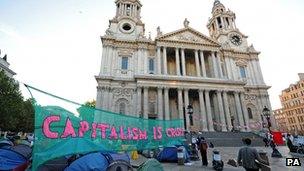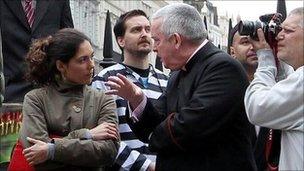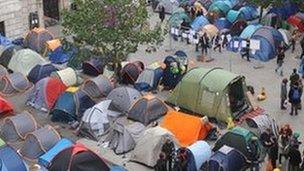Reaction to Church's handling of St Paul's protest
- Published
The Church of England has come under scrutiny over its handling of a protest outside St Paul's Cathedral against the financial system.
It follows the cathedral closing its doors to the public for the first time since World War II and the consequent resignations of the cathedral's dean, Rt Rev Graeme Knowles, and chancellor, Dr Giles Fraser.
Clergymen and religious experts give their views to the BBC on how the Church has handled the protest.
Tim Ellis, Bishop of Grantham
I think in terms of the Church of England's image in the country, this has been a disaster.

The cathedral has suspended its legal action to evict protesters' tents from outside St Paul's
We have a situation where a group of people are protesting against quite clear issues in the country today [and it] seems to me the church should be full square with them in questioning the system that we have.
Any protest is a healthy sign in a healthy democracy. A society which tries to oppress protest is on the rocky road to ruin.
From the very outset, the cathedral authorities should have listened to exactly what the protesters were saying as a body. They would have found, I think, as Giles Fraser was saying, that there are elements within the protest that the Church agreed with.
Had we entered into the conversation, I think there could have been a very profitable national debate by the partnership of the Church and those protesters.
As far as St Paul's goes, and the Diocese of London, I think they will retreat into quietude and quietly lick their wounds and say where do we go from here as a diocesan church?
In terms of the national Church, the Archbishop of Canterbury seems to be saying things which will lead to a national debate on these issues.
George Pitcher, an Anglican priest and former Archbishop of Canterbury's public affairs secretary
I think some of the language used by the Corporation of the City of London has been reprehensible in these circumstances; quite inappropriate with the talk of sweeping away these sorts of camps - getting rid of the protest movement really is what they mean.
Talking about these camps cropping up like boils across our city, and indeed the mayor of London shouting at the protesters, "In the name of God and Mammon go!".
I think that's really pantomime material and I'm glad that the Church is dissociating itself from it.
Paul Handley, Church Times editor
For years St Paul's has been quite active in questioning the ethics of the City and so it feels wrongfooted by it being placed on the wrong side (of the debate).

Dean Knowles said his position had become untenable
The majority of Christians share the misgivings of these protesters - however, these are being overlooked now. Many in the Church are frustrated as this is precisely something that the Church should be involved in, yet they appear to be on the wrong side.
The resignations themselves are of significance to St Paul's, they indicate the human side of it all. These are passionate people who are struggling with a difficult situation.
St Paul's has got to find a way of digging itself out of it. The Church in general needs to tackle the bigger issues about economic justice and be seen to be doing that if it wants to get its reputation back.
Ruth Gledhill, religious correspondent for The Times
The resignations show the huge divisions at the leadership of the cathedral. The cathedral in particular has been brought to its knees by it but I think it's been extremely damaging for the Church as a whole in Britain if not Christianity in the West.
It has failed to marry up its purpose as a Church, serving the city - almost as a parish church as well as the national cathedral. It's failed to marry that up with its mission - its gospel mission - to serve the poor and the oppressed and the dispossessed as represented by the Occupy London protesters.
It is a practical issue (about health and safety of people attending the cathedral) but that's the problem, they haven't managed to capture the debate in a philosophical way.
Dr Rowan Williams has now spoken out but it's a shame he didn't see himself able to do so before because he is someone who can capture these debates very powerfully from a philosophical Christian standpoint.
Diarmaid MacCulloch, Professor of the History of the Church, Oxford University
Some people thought the Church was irrelevant, fuzzy and woolly, but now it's been front page news for days.
It's extremely good news for cathedrals (that St Paul's was chosen as a protest site). The indication is that people value them doing what they intend to do which is to be the mother church for their area.
That's not to say it handled it well. It reflects that the Church of England is a grown-up institution which tries to reconcile and find ways through, not by headline-grabbing but by finding sensible solutions. In this case, the dean didn't do that well but he tried.

There are more than 200 tents around St Paul's Cathedral
It was the wrong answer to close, that did not give a good message. To close the doors of a church is never a good message. The Church was doing a lot of talking but this was an occasion when it probably needed a more open, public discussion.
It's not the business of the Church to be a set of economists. What the Church can do is to invite people to think thoughtfully, be honest, and to ask the right questions. It has experience in asking questions, but it can get it wrong when it give answers.
The Church should always be on the side of the poor but it remembers that the rich have souls.
History will view the Church as a set of human beings muddling through, honestly trying to do the best they can. The Church is the body of Christ but it's always going to be full of wounds and the Church will reflect that.
Reverend Paul Turp, Rector of Shoreditch
We have the extremes of rich and poor within my patch and it is only within the Church that you will find people from both of those extremes sitting together on the same pew - otherwise they don't mix.
We're always as a Church in a no-win situation.
The cathedral should open its doors and run a huge night shelter across these cold winter nights and let people off the streets to come and sleep here.
I get as mad and angry with the Church of England as anything but I'm also deeply in love with it and I think the Church of England still has a powerful voice to help these people articulate what is in their hearts and mind and to help them say what they want to say.
Reverend Alan Green, rector of St John's, Bethnal Green
I think it's really sad that both of them have resigned. This should not have been the end of their ministry here but if we are able to listen to the positive side of the messages as well as the disruption then I think there's an opportunity for the Church to anticipate a renewal of British politics and values.
The Church of England is very good at falling out with itself with different views and that's how it should be. But I would very much prefer that the Church of England moved away from its internal, political arguing and took seriously the issues that are happening within our own society.
- Published1 November 2011
- Published1 November 2011
- Published31 October 2011
- Published30 October 2011
- Published27 October 2011
- Published22 October 2011
- Published22 October 2011